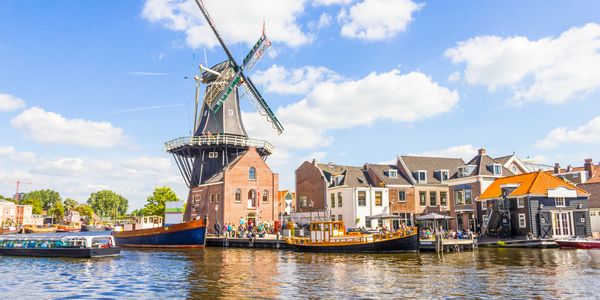Municipality Groningen's 20-Year Journey with AMCS Software
Customer Company Size
Large Corporate
Region
- Europe
Country
- Netherlands
Product
- AMCS Enterprise Management
- Mobile Workforce tablet solution
- Qlikview
- Diftar waste registration system
Tech Stack
- AMCS platform
- Qlikview
- Diftar waste registration system
Implementation Scale
- Enterprise-wide Deployment
Impact Metrics
- Cost Savings
- Customer Satisfaction
- Productivity Improvements
- Environmental Impact Reduction
Technology Category
- Functional Applications - Enterprise Resource Planning Systems (ERP)
- Analytics & Modeling - Predictive Analytics
- Functional Applications - Remote Monitoring & Control Systems
Applicable Industries
- Cities & Municipalities
Applicable Functions
- Facility Management
- Business Operation
- Logistics & Transportation
Use Cases
- Fleet Management
- Digital Twin
- Predictive Maintenance
- Remote Asset Management
Services
- System Integration
- Data Science Services
- Software Design & Engineering Services
About The Customer
Municipality Groningen is dedicated to creating a pleasant and sustainable living environment for its residents, known as Stadjers. The municipality is responsible for a wide range of services, including road and sewer maintenance, urban tree and shrub care, and daily waste collection. They also offer commercial services such as corporate waste collection, pest control, graffiti removal, and container hire. With a fleet of over 200 trucks, 40 Ravo sweepers, and 20 tractors, the municipality employs nearly 700 workers who are a familiar presence in the community. IT plays a crucial role in their operations, with various software applications from the AMCS platform being integral to their daily activities.
The Challenge
The greatest challenge for Municipality Groningen was to centralize all branches of their service into a single system. Each service branch previously worked with its own software, which required significant effort to integrate into a centralized system. The goal was to streamline operations and improve efficiency across various activities such as cleaning, waste collection, and commercial business activities. The integration process involved automating numerous tasks and collecting data for analysis to optimize operations. The challenge was not only technical but also involved ensuring that the new system was user-friendly and could be seamlessly adopted by the workforce.
The Solution
Municipality Groningen implemented the AMCS Enterprise Management back office software to centralize their service branches into a single system. This integration allowed them to automate a wide range of activities, from waste collection to personnel management. They also adopted the Mobile Workforce tablet solution, replacing all on-board computers in their trucks with iPads. This new system provided real-time tracking and scheduling capabilities, making it easier for dispatchers to manage workloads and optimize routes. Additionally, they utilized Qlikview for data analysis and the Diftar waste registration system to enhance their waste management processes. The new system has made operations more efficient, user-friendly, and environmentally friendly.
Operational Impact
Quantitative Benefit

Case Study missing?
Start adding your own!
Register with your work email and create a new case study profile for your business.
Related Case Studies.

Case Study
Turning A Stadium Into A Smart Building
Honeywell created what it called the “intelligent system” for the National Stadium in Beijing, China, turning the venue for the opening and closing events at the 2008 Summer Olympics into a “smart building.” Designed by highly controversial artist Ai Weiwei, the “Bird’s Nest” remains one of the most impressive feats of stadium architecture in the world. The 250,000 square meter structure housed more than 100,000 athletes and spectators at a time. To accommodate such capacity, China turned to Honeywell’s EBI Integrated Building Management System to create an integrated “intelligent system” for improved building security, safety and energy efficiency.
.png)
Case Study
Smart Street Light Network (Copenhagen)
Key stakeholders are taking a comprehensive approach to rethinking smart city innovation. City leaders have collaborated through partnerships involving government, research institutions and solution providers. The Copenhagen Solutions Lab is one of the leading organizations at the forefront of this movement. By bringing together manufacturers with municipal buyers, the Copenhagen Solutions Lab has catalyzed the development and deployment of next-generation smart city innovations. Copenhagen is leveraging this unique approach to accelerate the implementation of smart city solutions. One of the primary focus areas is LED street lighting.

Case Study
Buoy Status Monitoring with LoRa
The Netherlands are well-known for their inland waterways, canals, sluices and of course port activities. The Dutch Ministry of Infrastructure indicates that there are thousands of buoys and fixed items in and near water environments that would profit from IoT monitoring. One of the problems with buoys for example, is that they get hit by ships and the anchor cable breaks. Without connectivity, it takes quite some time to find out that something has happened with that buoy. Not to mention the costs of renting a boat to go to the buoy to fix it. Another important issue, is that there is no real-time monitoring of the buoys at this moment. Only by physically visiting the object on the water, one gains insight in its status.

Case Study
China Mobile Smart Parking
Smart Parking, powered by NB-IoT technology, is making it easier for drivers to find free parking spots. Cities can better manage their parking assets and maximize the revenue available to them as a result. Drivers searching for parking create congestion and pollution by circling and hunting for available parking. Smart Parking services are able to significantly ease these problems by guiding a driver directly to a parking space.

Case Study
Barcelona Case Study
Barcelona’s heavy traffic and its associated high levels of pollution were the primary factors that motivated some companies and universities to work on strategies for improving traffic in the city centre. Bitcarrier is one of the technologies involved in the In4Mo Project, whose main objective is to develop the applications that form the core of smart mobility, one of the fundamental pillars of the smart city concept.



